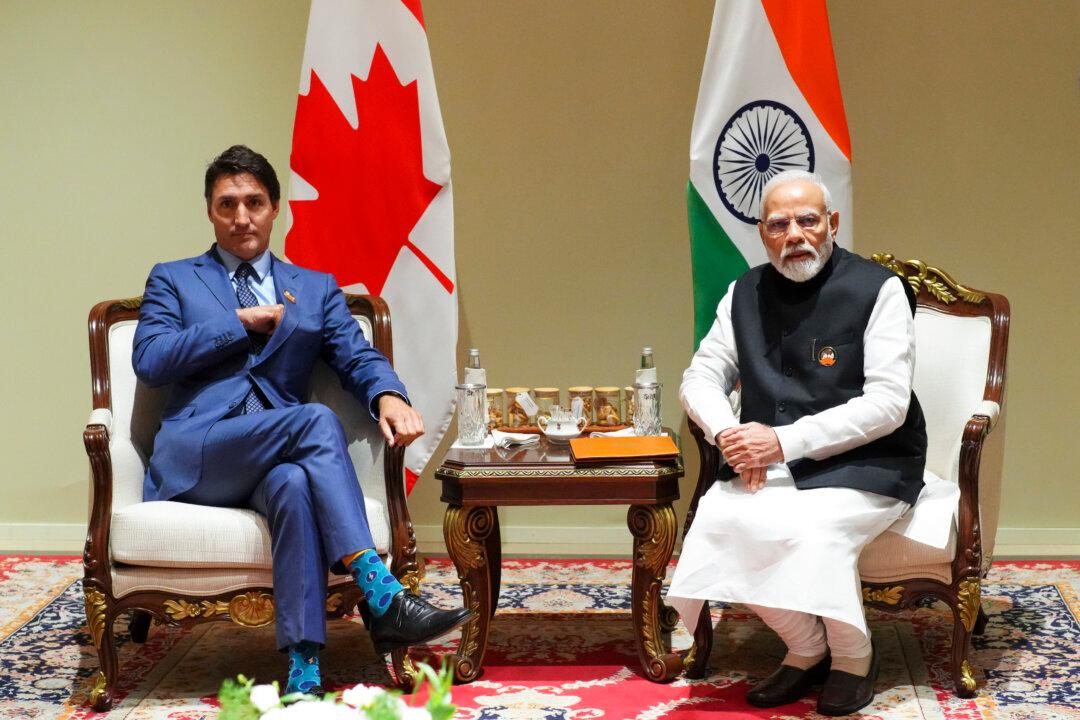The G20 Summit in New Delhi provided ample evidence to suggest that Prime Minister Justin Trudeau is not well regarded in India and that he is not changing his tack to improve relations with that country—identified as a critical partner in Ottawa’s new Indo-Pacific Strategy.
The relationship between Canada and India appears to be cooling at a time when Indian Prime Minister Narendra Modi is envisioning his country’s rise on the global stage and the United States is seeing India as a counterweight to China.
India expert Vivek Dehejia, economics and philosophy professor at Carleton University who was in India for Mr. Trudeau’s 2018 visit, said the Sept. 9–10 trip “was a miniature repeat of the 2018 fiasco, when Trudeau went from one gaffe [to] another.”
In a Sept. 11 interview with The Epoch Times, Mr. Dehejia noted the contrast between the India strategy used by U.S. President Joe Biden and that used by Mr. Trudeau, as well as the difference in the results achieved.
“In my judgment, what’s happened here is that rather than taking a strategic kind of geopolitical big-picture view of India’s increasing importance, Trudeau is looking at India, not through that strategic lens, but through the lens of his domestic political constituencies—in particular, the large Canadian diaspora who have been reliable Trudeau Liberal voters,” he said.
“In a sense, he has handcuffed himself by focusing on a diaspora of grievances.”
About 4 percent, or 1.3 million of Canada’s population, are of Indian heritage.
Mr. Dehejia says the U.S. outreach to India has been consistent from former president Donald Trump through to Mr. Biden—despite their many differences.
‘Just Not Interested’
New Delhi’s strategy revolves around maximizing partnerships and deterring a rising China, said Karthik Nachiappan, a senior fellow with the Macdonald-Laurier Institute, in a March op-ed for the Toronto Sun.
“Ottawa must strategically recognize and support India’s economic and geopolitical ascent and help it and other partners manage an increasingly tense Indo-Pacific,” he wrote.
The readouts from Canada’s Prime Minister’s Office and India’s Ministry of External Affairs (MEA) about the meeting between the two leaders paint different pictures.
Ottawa’s readout prominently touts how Mr. Trudeau “raised the importance of the rule of law” and climate change.
Delhi’s statement scolds Mr. Trudeau for supporting the Sikh Khalistani separatist movement, which has a base in Canada.
“He [Mr. Modi] conveyed our strong concerns about continuing anti-India activities of extremist elements in Canada. They are promoting secessionism and inciting violence against Indian diplomats, damaging diplomatic premises, and threatening the Indian community in Canada and their places of worship,” said the MEA.
In addition, Ottawa has not provided substantive reasons for the pause in trade negotiations with India, which came just three months after the two nations said they were going to seal an initial deal by the end of 2023.
“Does Trudeau even understand the damage he is doing to our trade relationship with India - one of our most important trading partners?” Saskatchewan premier Scott Moe tweeted on Sept. 11.
Mr. Moe was following up on a letter from Jeremy Harrison, his minister of trade and export development, to Mary Ng, the federal minister of international trade.
“I wish to also convey our Government’s deep displeasure that Prime Minister Trudeau has used the occasion of the G20 summit to not seek progress on the EPTA [Early Progress Trade Agreement], but instead infer that the Government of India does not respect the rule of law,” Mr. Harrison wrote.
India was Canada’s 10th-largest trading partner in 2022, but Mr. Harrison noted that Saskatchewan trade with India makes up 30 to 40 percent of all Canadian trade with India in any given year.
Mr. Dehejia says that “all of those things suggest that Canada is just not interested really, in stepping back from diaspora issues, and seriously engaging with India.”





